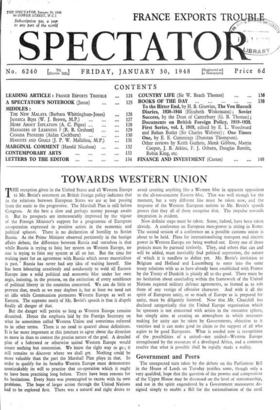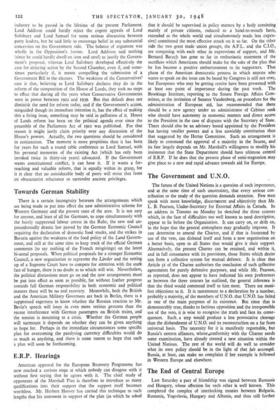Government and Peers
The unexpected turn taken by the debate on the Parliament Bill in the House of Lords on Tuesday justifies some, though only a very qualified, hope that the question of the powers and composition of the Upper House may be discussed on the level of statesmanship, and not in the spirit engendered by a Government manoeuvre de- signed simply to enable a Bill for the nationalisation of the steel industry to be passed in the lifetime of the present Parliament. Lord Addison could hardly reject the cogent appeals of Lord Salisbury and Lord Samuel for some serious discussion between party leaders, but he said little to encourage belief in any substantial concession on the Government side. The balance of argument was wholly in the Opposition's favour. Lord Addison said nothing (since he could hardly dwell on iron and steel) to justify the Govern- ment's proposal, whereas Lord Salisbury developed effectively the case for delaying action by the Second Chamber, even if, and some- times particularly if, it meant compelling the submission of a Government Bill to the electors. The weakness of the Conservatives' case is that, believing as Lord Salisbury declares they do in the reform of the composition of the House of Lords, they took no steps to effect that during all the years when Conservative Governments were in power between 1922 and 1939. But that default does not diminish the need for reform today, and if the Government's action, misguided though its immediate intention is, has the effect of making this a living issue, something may be said in palliation of it. House of Lords reform has been on the political agenda ever since the preamble of the Parliament Act of 1911 was published. For that reason it might justly claim priority over any discussion of the House's powers. Actually, the two questions should be considered in conjunction. The moment is more propitious than it has been for years for such a round table conference as Lord Samuel, with his personal memories of the existing Act (which has only been invoked twice in thirty-six years) advocated. If the Government .wants constitutional conflict, it can have it. If it wants a far- reaching and valuable reform, that is equally within its grasp, for it is clear that no considerable body of peers will resist that from an obscurantist reluctance to surrender ancient privileges.



































